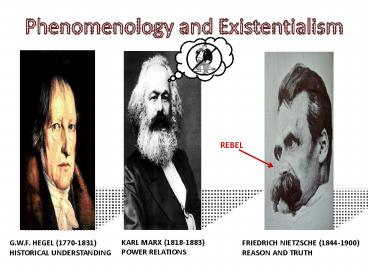Phenomenology and Existentialism PowerPoint PPT Presentation
1 / 12
Title: Phenomenology and Existentialism
1
Phenomenology and Existentialism
REBEL
KARL MARX (1818-1883) POWER RELATIONS
G.W.F. HEGEL (1770-1831) HISTORICAL UNDERSTANDING
FRIEDRICH NIETZSCHE (1844-1900) REASON AND TRUTH
2
Phenomenology
Phenomenology n. from the Greek phainomenon
meaning appearance Phenomenology is the study
of experience as experience. Husserls
phenomenology is opposed to logical positivism.
EDMUND HUSSERL (1859-1938) FOUNDER OF
PHENOMENOLOGY.
3
THE OPPOSITION
- PHENOMENOLOGY
Experience is passive. It consists of a
collection of passively received ideas!
- Experience is not passive.
- Active reflection is what allows us to become
aware of any single aspect of experience. - We must not view experience in any relation to
scientific concepts. Phenomenology must replace
the natural sciences in the study of experience. - Consciousness has an inherently
- a priori structure.
- ? Experience is not passive.
RUDOLPH CARNAP (1891-1970) DEDICATED LOGICAL
POSITIVIST
4
ALONG CAME MARTIN
- Inspired the work of Jean-Paul Sartre (French
Existentialist). - Being and Time (1927)
- What is Being?
- The many faces of Dasein consist of a priori
existentials. - The inauthentic seeks to escape from the
possibilities and temporality of Being. - Criticized the subject-object concept of
knowledge, Enlightenment rationality, and
Nietzsches will to power.
I am not an existentialist.
MARTIN HEIDEGGER (1889-1976) NOT AN
EXISTENTIALIST
5
French Existentialism
SIMONE DE BEAUVOIR (1908-1986) FRENCH
EXISTENTIALIST AND FEMINIST The Ethics of
Ambiguity (1947) The Second Sex (1949)
JEAN-PAUL SARTRE (1905-1980) FRENCH
EXISTENTIALIST Being and Nothingness
(1943) Critique of Dialectical Reason (1960)
Existence precedes essence.
Phenomenology
MAURICE MERLEAU-PONTY (1908-1961) PSYCHOLOGIST,
PHENOMENOLOGIST Phenomenology of Perception
(1945) Les Temps Modernes
6
Edmund Husserl
Moravian
Mathematics Philosophy of Arithmetic (1891)
Met Franz Brentano
Philosophy Ideas General Introduction to Pure
Phenomenology (1913)
Philosophy professor at Halle, Göttingen and
Freiburg
1928 Retirement.
7
INTENTIONALITY is the main defining feature of
MENTAL PHENOMENA. This I learned from Brentano.
A property of mental states, intentional
perceptual states are about or directed to
something in the world.
8
Phenomenology
Eidetic Science
Pure phenomenology is a science of essential
Being. Eidetic Reduction factual (empirical) ?
essential universality The phenomena of
phenomenology is characterized as
non-real. Original Division Empirical and a
priori Husserls Division Fact and
Essence Real and not-Real
9
THE GREAT DIVIDE
Real Being Vs. Temporal Being
Transcendentally purified experiences are
non-realities. (p. 228)
REAL EXPERIENCE
Purified through Phenomenological study
ESSENTIAL BEING
10
Ideas General Introduction to Pure Phenomenology
The natural standpoint as humans, we experience
space and time immediately and intuitively. Throug
h mental acts we move freely within a moment of
experience, able to look forwards and backwards
in time and space. In its constant presence, the
world becomes a world of values. Others relate
to the world in the same way as I do. What is
known in common, is known in different ways. In
our perfect freedom, we can attempt to doubt
everything. (p. 231) Bracketing the natural
world provides the foundation for
phenomenological study. Consciousness in itself
has a being of its own. (p. 233) The paper
example (p. 233). Cogitatio perceptual
experience Cogitatum something perceived
11
Ideas General Introduction to Pure Phenomenology
To be absorbed in appreciation of some matter is
to apprehend both the matter itself and its
value. Thus intentional objects are two-fold
subject matter pure and simple and the full
intentional object. (p. 235) Immanent (or inner)
perception constitutes a unity between cogitatio
and cogitatum. True Being exists in objective
space. The real object to which this being
corresponds is a Euclidean symbol. The table
example (p. 237). Because the Thing itself
cannot find a place in the system of experience,
it is considered transcendent. Experience itself
cannot be perceived in its completeness.
12
It is essentially something that flows, and
staring from the present moment we can swim after
it, our gaze reflectively turned towards it,
whilst the stretches we leave in our wake are
lost to our perception. (p. 238)
EXPERIENCE

